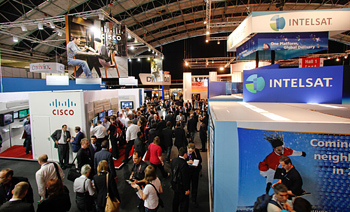IBC Ends on Optimistic Note

Attendance was down 7 percent at this year's IBC.
In a year where trade show attendance has declined due to the economy, the 2009 IBC Show ended on an optimistic note after organizers crunched the numbers.
The final tally wasn’t as bad as many anticipated: according to the IBC, 45,547 attendees walked through the doors of the RAI in Amsterdam over the five day show, only 7 percent down from last year’s 49,250. There were almost 100 less exhibitors—1,355, compared with last year’s 1,451. “Taking exhibitors out of the calculation, visitor numbers were even more impressive, falling by less than 5 percent,” said IBC COO Michael Crimp. Sony, Snell and Vizrt were among the notable no-shows this year. Nevertheless, the companies were there to meet customers and show organizers expressed confidence that some of the absent exhibitors would return next year.
In addition to the ever popular “doing more with less” theme that seems to have permeated most industries worldwide, other highlights included:
3D: Officials from BSkyB, which plans to launch a 3D channel in 2010, predicted that the technology is “going to be big, really big. We take it extremely seriously and it is not a game for us,” according to the IBC Daily. 3ality Digital, a pioneer in 3D production, captured live, real-time 3D images at “The Beach,” a popular destination for IBC attendees, which were beamed on the IBC Big Screen. Attendees to Sunday night’s IBC’s Innovation Awards were treated to a 16-minute preview of James Cameron’s highly anticipated “Avatar” 3D film, which will be released later this year. A BBC official opined at the show that that it may carry portions of the 2012 Olympics in London in 3D, according to the Guardian. And David Wood of the EBU warned of potential eye strain problems if 3D becomes more popular. “3D programming should come with a health warning. Sky TV is showing 3D, and the person giving out the glasses there said it gave her a headache,” he told TVB.
Acquisitions: Several notable buyouts were announced just prior to the show. Blackmagic Designs said it was acquiring Da Vinci, a leading color correction company. Blackmagic provided a number of details about product focus and direction, including an emphasis on future development for Resolve and Revival products. On the other hand, Avid came forward to confirm that it had recently acquired MaxT, a developer of online collaborative editing systems, but was mum about future plans for the company. Grass Valley confirmed that negotiations for the company’s sale are in the final stages and that it expects to announce a buyer before year’s end. Editshare, a developer of cross-platform collaborative editing and shared media storage systems announced that it had acquired Geev broadcast video servers and the Lightworks nonlinear editing platform.
Loudness: A number of companies were touting loudness solutions, including Miranda, which announced it was incorporating Junder Audio's "Level Magic" technology into its "Automatic Loundess Control" that will first be integrated into its Densite processors; Junger Audio showed new ESDI cards for Level Magic; and Linear Acoustic, who introduced the Carbon Hybrid Metadata Loudness Controller.
Production: Organizers were pleased with the debut of the IBC “Production Village” designed to serve as a central repository for providing hands on experiences with the latest production gear, as well as side by side comparisons and training theatres.
Virtualization: Harris announced its “Harris Virtual World,” based on the popular Second Life avatar-based and designed for secure business to business interactions. Quantel launched virtualization software for Final Cut Pro, designed to minimize latency and improve and accelerate file management.
Look for more show coverage in the Oct. 21 issue of TV Technology.
The professional video industry's #1 source for news, trends and product and tech information. Sign up below.
